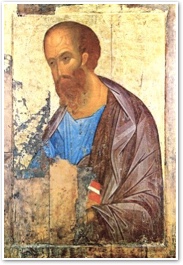Pharisaism
- SERVANT OF GOD MONSIGNOR LUIGI GIUSSANI
Moralism has two grave symptoms.
 The first is pharisaism. No one is more contrary to the Gospel than someone who considers himself honest, because he has no need of Christ. The Pharisee lives without any tension, because he himself establishes the measure of what is right and he identifies it with what he thinks he is capable of. As a defense, he uses violence against anyone who is not like him.
The first is pharisaism. No one is more contrary to the Gospel than someone who considers himself honest, because he has no need of Christ. The Pharisee lives without any tension, because he himself establishes the measure of what is right and he identifies it with what he thinks he is capable of. As a defense, he uses violence against anyone who is not like him.
So the second symptom is readiness to lie. On the one hand he justifies himself, and on the other hand he hates and condemns his neighbor. But there is one further consequence of what we have said. There can be many different moralities, and the intentions that form them can all seem just in theory, but man is impotent before the ideals that he himself lays down as a path to follow on his journey.
Who is capable of morality? In his weakness, every man is a sinner. If we lack the awareness of being sinners we cannot approach anyone without injustice, presumption, pretension, aggression, calumny, and falsehood. Awareness of being sinners makes us capable of discretion, keen on the truth for ourselves and for others, hopeful that at least the other might be better than oneself, and humble. We cannot establish any true relationship unless we begin from the awareness of being sinners, of what we lack and of where we fail.
 This is Meaghen Gonzalez, Editor of CERC. I hope you appreciated this piece. We curate these articles especially for believers like you.
This is Meaghen Gonzalez, Editor of CERC. I hope you appreciated this piece. We curate these articles especially for believers like you.
Please show your appreciation by making a $3 donation. CERC is entirely reader supported.

Acknowledgement
 Servant of God Monsignor Luigi Giussani. "Pharisaism." excerpt from Generating Traces in the History of the World: New Traces of the Christian Experience (Kingston, ON: McGill-Queen's University Press, 2010).
Servant of God Monsignor Luigi Giussani. "Pharisaism." excerpt from Generating Traces in the History of the World: New Traces of the Christian Experience (Kingston, ON: McGill-Queen's University Press, 2010).
This excerpt appeared in Magnificat.
Reprinted with permission of McGill-Queen's University Press.
The Author

 Monsignor Luigi Giussani (1922-2005), as a result of his encounters with young people, began a method of communicating the Christian faith, starting from the fundamental needs of human experience. He founded the Catholic lay movement Communion and Liberation in 1954. His books include Generating Traces in the History of the World: New Traces of the Christian Experience, The Risk of Education: Discovering Our Ultimate Destiny, At the Origin of the Christian Claim, Is It Possible To Live This Way? Volume 1: Faith, Is It Possible To Live This Way? Volume 2: Hope, Is It Possible To Live This Way? Volume 3: Charity, The Religious Sense, The Journey to Truth is an Experience, and Why the Church?
Monsignor Luigi Giussani (1922-2005), as a result of his encounters with young people, began a method of communicating the Christian faith, starting from the fundamental needs of human experience. He founded the Catholic lay movement Communion and Liberation in 1954. His books include Generating Traces in the History of the World: New Traces of the Christian Experience, The Risk of Education: Discovering Our Ultimate Destiny, At the Origin of the Christian Claim, Is It Possible To Live This Way? Volume 1: Faith, Is It Possible To Live This Way? Volume 2: Hope, Is It Possible To Live This Way? Volume 3: Charity, The Religious Sense, The Journey to Truth is an Experience, and Why the Church?




